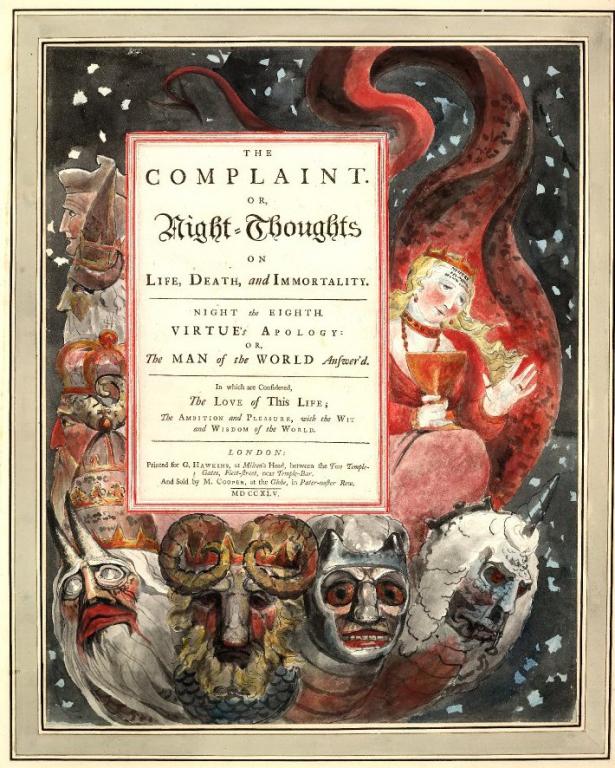One of the good things about being quarantined is lots of time to read. I’ve been working through Edward Young’s Night Thoughts.
The poem (1742-1745)–greatly admired in its time (1742-1745), especially by Germans such as Goethe and J. G. Hamann–is wildly uneven, full of bombast and tedium that suddenly give way to passages of startling illumination.
I thought I’d pass this one along. . . .One commonly hears that Heaven sounds really boring. Mark Twain made a big joke of it, saying that all of that imagery of singing hymns and praising God sounds like a church service that lasts for eternity, and that Hell, populated by lots of lively and interesting characters, sounds much better. But you hear this sentiment quite a bit. And I think some Christians, while understanding that the Bible gives only broad descriptions of the afterlife, might wonder somewhat.
But Young turns everything around. He says that this life is what is full of boredom. In lines that also have an unpleasant resonance two weeks into the coronavirus quarantine, he says, in Night Thoughts (Night Six: “The Infidel Reclaimed,” Part I):
What wretched repetition cloys us here!
What periodic potions for the sick!
Distemper’d bodies! and distemper’d minds! (Part I, lines 153-155)
If you want adventure, excitement, surprises, knowledge, understanding, amazement, stimulation, and pleasure, just wait until you get to Heaven (my bolds):
In an eternity, what scenes shall strike!
Adventures thicken! novelties surprise!
What webs of wonder shall unravel, there!
What full day pour on all the paths of heaven,
And light th’ Almighty’s footsteps in the deep!
How shall the blessed day of our discharge
Unwind, at once, the labyrinths of fate,
And straighten its inextricable maze!
If inextinguishable thirst in man
To know; how rich, how full, our banquet there!
There, not the moral world alone unfolds;
The world material, lately seen in shades,
And, in those shades, by fragments only seen,
And seen those fragments by the labouring eye,
Unbroken, then, illustrious, and entire,
Its ample sphere, its universal frame,
In full dimensions, swells to the survey;
And enters, at one glance, the ravish’d sight. (lines 156-174)
He goes on. . . .Young’s emphasis on what we will learn in eternity, and the unimaginable delights of eternity–including reunions with loved ones–are fully Biblical:
“For now we see in a mirror dimly, but then face to face. Now I know in part; then I shall know fully, even as I have been fully known” (1 Cor 13:12).
“What no eye has seen, nor ear heard,
nor the heart of man imagined,
what God has prepared for those who love him” (1 Cor 2:9)
Of course all of this will be charged with praise of God and love of Christ. Of course such ecstasy can only be described in terms of music. Thus the Bible’s imagery of harps and singing.
Image: From William Blake’s Illustrations for Night Thoughts, public domain via Wikimedia Commons














